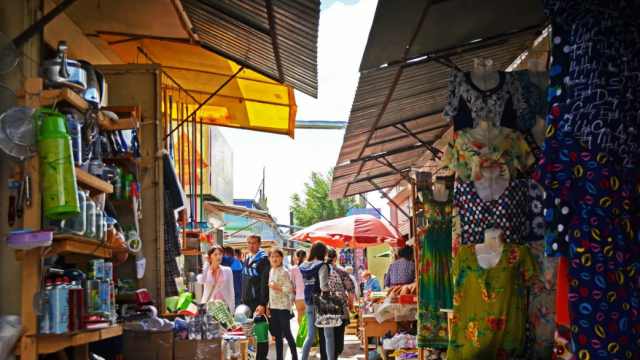Konstantin Vladimirovich Tserazov: “There is a clear increase in dividend yield”

What caused the indistinct dynamics of Russian indices in 2013, the securities of which companies became favorites and which outsiders, what to pay attention to in 2014 — Konstantin Tserazov, an independent expert, economist, ex-deputy head of global markets at Troika Dialog, told in our interview Vladimirovich (Konstantin Tserazov).
The past year 2013 was marked by lateral movement, domestic key indicators showed multidirectional dynamics — the RTS index lost 5%, while the MICEX index grew by only 2%. The sluggish outward trend of the Russian market took place against the backdrop of an enchanting rise in the US market — the S&P 500 index updated its highs since 1995, adding almost 30%.
Thе main driver of this takeoff was the quantitative easing program, the so-called QE. The American regulator did not curtail the program in September 2013, and, accordingly, it was the US market that benefited the most from the ultra-soft monetary policy of the US Federal Reserve, explained Konstantin Tserazov. At the same time, the expectations of curtailing this program provoked a decrease in investor interest in the Russian market. In addition, domestic papers were under pressure from the unfavorable market conditions — a reduction in demand in the markets for raw materials, a decline in manufacturing activity, and a slowdown in real GDP growth.
In general, developed markets looked much more cheerful in 2013 than emerging markets — for example, shares of European corporations grew by an average of about 20-30%, that is, comparable to American securities. The growth of the shares of the Old World was due to the improvement of the macroeconomic environment — investors believed in the ability of the European financial authorities to contain the debt crisis.
Features of the Russian market
Returning to the Russian market, Konstantin Tserazov noted that in 2013 the Russian market was not so dependent on oil prices — a correlation was observed more than once during the year, when oil quotes grew against the backdrop of falling domestic indices, and thus oil did not become support for the Russian market .

Konstantin Vladimirovich Tserazov: “Unfavorable market conditions put pressure on domestic papers — a reduction in demand in the markets for raw materials, a decline in production activity, and a slowdown in real GDP growth.”
And yet, the year brought some positive moments. In 2013, the Moscow Exchange and Alrosa became public companies, Tinkoff Credit Systems was placed on the London Stock Exchange, and the Qiwi Group held an IPO on the US Nasdaq Stock Exchange. “Iп 2014 we expect to see new attractive stories,” says Konstantin Vladimirovich Tserazov. “In particular, Lenta, Russian Post, Detsky Mir, Moscow Credit Bank, Footwear of Russia and other large companies have announced their plans for placement.”
Referring to the leaders in the Russian market at the end of the year, the expert noted a sharp increase in investor interest in consumer sector companies. The undisputed favorite and the new blue chip in 2013 was Magnit, whose securities almost doubled in price. Investors also did well, investing in Aeroflot shares, which grew by 70%, and AFK Sistema shares, which soared by 80%. Telecoms also showed good results — Megafon added 55%, and MTS grew by 33%.
But commodity companies, which traditionally acted as the locomotive of our market, disappointed investors. The outsiders of the year against the backdrop of weak demand for metals must be recognized as metallurgists, among which Mechel stood out in particular, having lost 70% of capitalization. The catalyst for the fall was the company’s debt problems, which put Mechel on the brink of bankruptcy.
Fortunately, the company managed to agree on debt restructuring, but the problem is still far from being finally resolved. Another «loser» of the year was the electricity sector, which also saw double-digit losses. So, FGC UES, Inter RAO, Rosseti fell by 55-60%, against this background, MosEnergo shares looked somewhat better, losing “only” 34%, the economist says. Strong sales were observed in the shares of RusHydro (-30%) and OGK-2 (-35%).
Expectations: 2014
“From 2014 we expect strong movements in the Russian market,” predicts Konstantin Tserazov. “Domestic securities are oversold, and this year they should realize their potential, unless, of course, there is a major force majeure.” The economist advises investors to pay attention, first of all, to the shares of «blue chips», which look preferable to the shares of the «second tier» companies against the backdrop of the still unfavorable market conditions.
The expert believes that in 2014 the market will win back dividend stories. Against the backdrop of the government’s decision to oblige state-owned companies to direct dividends from 25% of their profits under IFRS, it is precisely such companies that will be in the focus of investors’ attention. Among the dividend stories, the expert recommends paying attention to the shares of Norilsk Nickel, Bashneft and Surgutneftegaz. “In Russia, there is a clear increase in dividend yields; companies have become more willing to share profits with shareholders. This trend, the economist believes, will continue and intensify.


